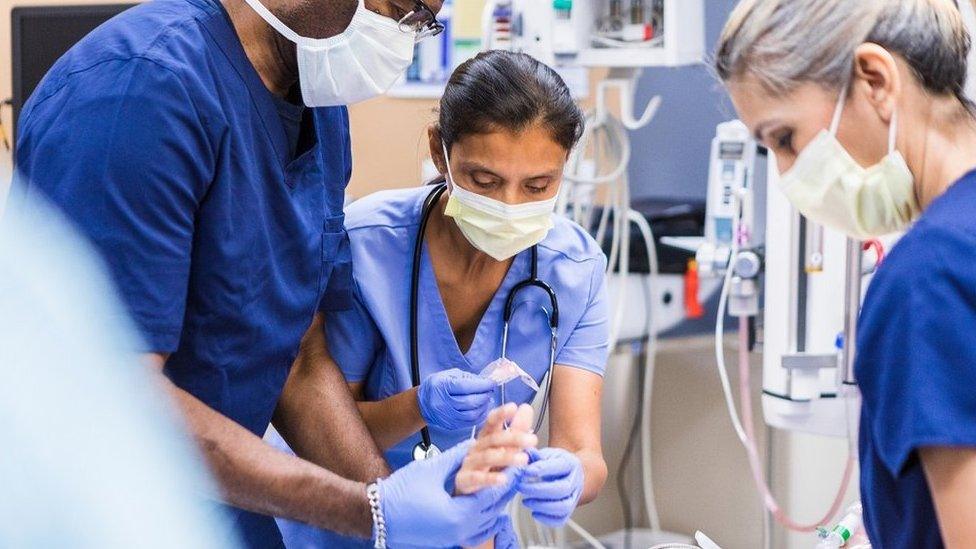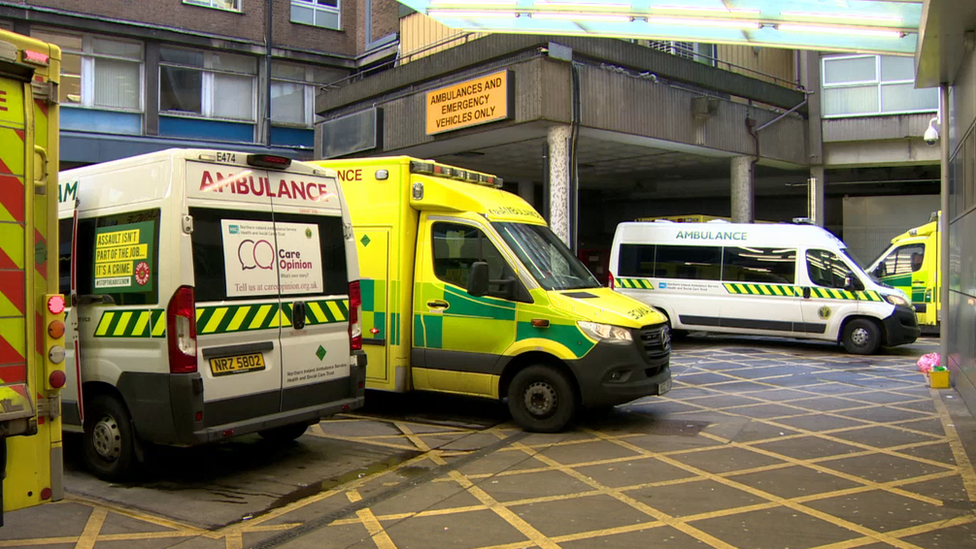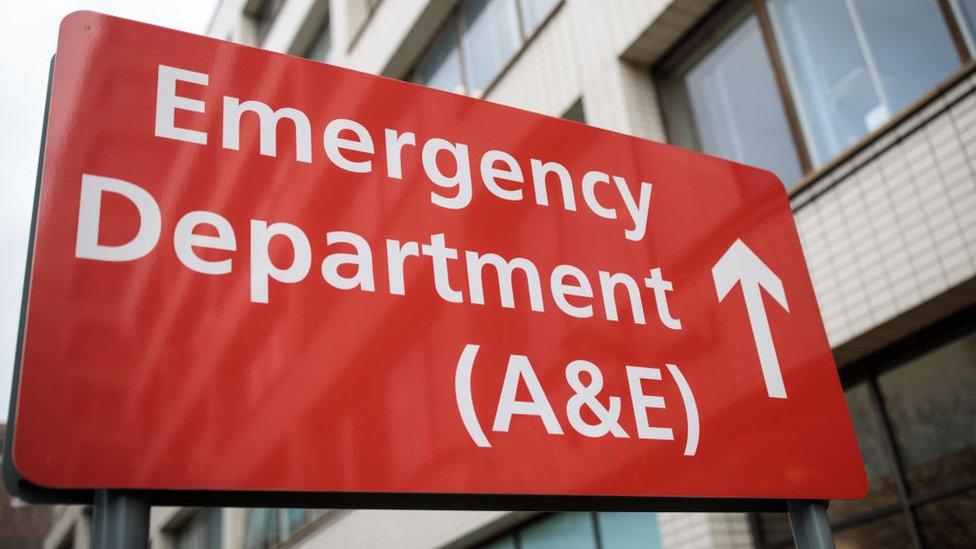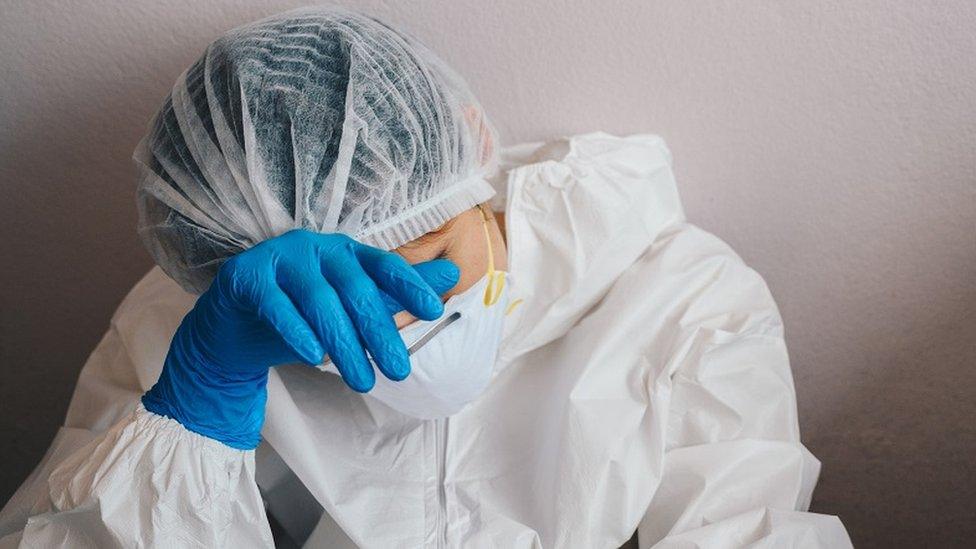Royal Victoria Hospital: ED staff 'disappointed' by patient safety report
- Published

Emergency Department staff at Belfast's Royal Victoria Hospital (RVH) have described a recent report into patient safety as "wholly unsatisfactory".
Staff said they were "deeply disappointed" in the lack of "explicit focus on patient safety" in the Regulation and Quality Improvement Authority (RQIA) report.
It was published in July after the RQIA carried out an unannounced inspection.
It said the department was operating beyond its core purpose and capacity.
In a letter to the RQIA seen by BBC News NI, staff said that despite taking part in a feedback session, where RQIA staff agreed that the emergency department was "unsafe", the final report did not sufficiently focus on patient safety.
The RQIA has defended the report, which also found that department staff were experiencing burnout.
In response to the criticism, it said the report does "articulate the patient safety impact of patient crowding, and reflects concerns of staff, who were clearly doing their best to provide safe care within the service".

The inspection happened in November 2022, when there were media reports of patients waiting for days in overcrowded areas and on trolleys.
Lengthy ambulance waits, negative reports by staff and patients being cared for in corridors and cupboards triggered headlines for months.
BBC News NI, after being given exclusive access to the emergency department, captured conditions that showed hospital trolleys packed tightly against each other, with patients waiting for days to be admitted onto a ward.
'Significant and serious outcome'
In its statement to BBC News NI, the RQIA said that during its inspection it found each of the five standards were breached, namely fire safety, workforce, environment, infection prevention and control, and medicines management.
It added there was an escalation due to service pressures regionally.
The regulators said this was a "a very significant and serious outcome".
They also said services operating below the minimum quality standards are "less able to prevent risks translating into actual events or incidents, and resulting in harm".
The RQIA stressed this is clearly recorded and reflected in the report.
But health staff have told BBC News NI the report did not go far enough and have questioned why it took eight months between inspection and publication.
The letter said they hoped the feedback could bring about improvement in RQIA inspections and highlight ongoing safety concerns.
It added that waiting times and the lack of safe patient flow at every stage of the patient journey are not adequately addressed in the report.
In response to allegations of a delay, the RQIA said it is committed to publishing reports in a "timely way" and it is important that inspection reports are subject to a robust peer review and accuracy checking process.
It added there was a significant volume of material to be reviewed, then time provided to the Belfast Trust to draw up its response to the Quality Improvement Plan.
It also said the report provides evidence of specific safety issues, including increases in reported incidents of patient falls, pressure sores and medication incidents; challenges in managing patients presenting with mental health crisis; and impact on patient's privacy and dignity.
The RQIA said it will follow up with the Belfast Trust to seek evidence of progress on the actions the trust has committed to take to address the issues identified in the inspection report.

Analysis: Brave, bold decisions needed for change
What can unlock the conundrum that is Northern Ireland's emergency department crisis?
Too often we hear that the lack of budget and government is to blame. And while the system by its very nature will never be perfect, it could be a lot better.
Emergency departments were in crisis long before Stormont fell and were in crisis when the power-sharing government collapsed previously too.
Like most health services, there needs to be change within emergency care if the NHS is to survive.
Doctors and nurses told me there's little thinking outside the box and those in charge often look as if they are being left to manage the optics instead.
There is a feeling health trusts should be more fearful of the regulator - and that the regulator should instil greater fear.
If the key to making emergency departments safer and less crowded requires shifting some resources away from hospitals and into the community instead - why can't this happen?
Related topics
- Published26 July 2023

- Published20 July 2023

- Published6 January 2023
